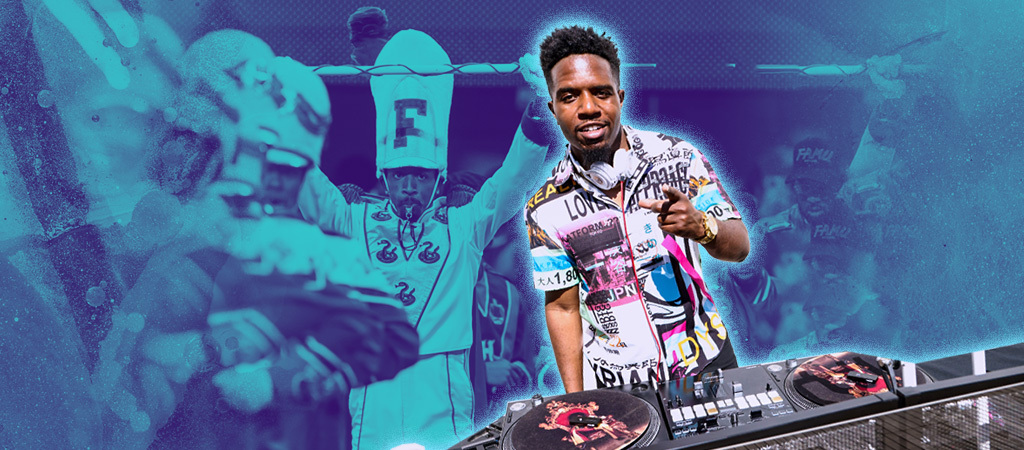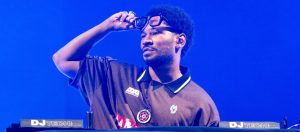Getty Image/Merle Cooper
Nobody has a better front-row perspective to the growth and development of pop music — and how it affects pop culture — than DJs. As the party controllers, they are the ones who set the vibes, yes, but they also get to see trends as they play out in real time. Sometimes, they’re even the ones sparking those trends.
In much the same way, so much of American culture has come from the Black experience: jazz, rock & roll, hip-hop, and dance music all started in music halls and underground venues catering to a Black American clientele that was often barred from more mainstream spaces.
One of the spaces that Black folks were kept out of was higher education. And so, as we found juke joints and empty rec rooms to develop jazz and launch hip-hop, Historically Black Colleges and Universities became cultural hot spots, where new movements in politics and art were nurtured and primed to change the course of American history.
In looking to gain some new insights and perspectives on how HBCUs have impacted America’s various party scenes, there was no better resource to turn to than LA native DJ R-Tistic. A veteran of the DJ scene, playing everything from local weekly residencies to corporate gigs to Coachella, R-Tistic has seen every kind of party imaginable. And, as a graduate of Florida Agricultural and Mechanical University — also known as Florida A&M or FAMU — he’s got the unique experience of seeing how Black student life can have an outsized impact on social and cultural standards, even hundreds of miles away.
Can you tell me a little bit about what your experience at FAMU was like and how that has informed your approach to your craft today?
I didn’t start DJing until I got there and I was… Plugging in my laptop. Initially I didn’t even plan to be a DJ. It was more so, it just happened throughout time. But I would say it influences it in so many ways because the main thing is that everybody’s coming from somewhere different. So at that time, this is the mid-2000s, when I feel like everybody’s music was so different. You can argue and say that it’s still different sounds now, but overall we know it’s a lot more similar. Back then, St. Louis had Chingy and J-Kwon and Nelly versus LA having Snoop and Game. And even The Bay sounded different from LA back then.
My first time doing a New Orleans party, they were like, “But you from LA. You don’t know our real music. All you know is Lil Wayne. We wanna hear Webbie.” At a HBCU, I think everybody comes in as a freshman kind of arrogant because it’s like, you coming from whatever city you came from. You think your city’s the best. I got there playing Bad Azz and Eastsidaz and Suga Free, and they’re like, “Why you playing this happy music?” Harlem dudes are playing all Dipset. And even Harlem and Brooklyn going at it, talking about Dipset versus Jay-Z or the Philly dudes and D Bloc. So I feel like it was just the fact that we had so many different styles, and we got to really meet people and see how they reacted to it.
I remember it was a group called Dude ‘n Nem, they had a song called “Watch My Feet.”
Juke, juke, juke, juke!
I would’ve had no idea what it was. It would’ve sounded foreign to my ears if I was just in LA hearing it because I was out there, and I heard, “Bang, bang, bang, skeet, skeet, skeet, and let me bang.” It made sense when I heard it. So it’s just the fact that you hear so many different varieties [at HBCUs].
I think over time, as the blogosphere moved in, that replaced that in-person experience.
In some ways it did. It is still different because even when I go back now, you’ll still hear more regional music. For FAMU specifically, it’s different only in that because of the cost of everything, I don’t think there’s as many out-of-state students as it used to be when I was there. Whenever I go to the Hood clubs out there now just to check in, I do hear a lot more of the southern music and just Florida music than I hear the other sounds. The blog area and social media and streaming, it did kind of homogenize things to an extent, but you still will get a different variety.
A lot of those artists had sounds that didn’t match where they were from. Even Kendrick. People argue now that “Not Like Us” is his first LA song. [Writer’s Note: Those people are SUPER wrong.] I get what they mean because “Swimming Pools” and those songs did not have a traditional West Coast sound. I think they grew up in the era where they didn’t really have as much of a direct connection to that regional sound. So they made music that appealed based on what they grew up watching on 106 & Park versus what was really local.
How did the melting pot aspect of going to an HBCU help those artists break through, then?
We had a showcase called “Rep Your City,” where each city had their own two minutes to play their regional song and do a dance. So Chicago did “Bang Bang Bang Skeet Skeet.” We might’ve did a “Wrong Idea” or something like that. We crip up. The Bay had a little hyphy moment. Everybody had their own little moments. And some people got booed. They booed us just because it was like, “What is this LA music?”
A lot of folks are still stuck in whatever their region is into. Freshman year, everybody gravitates toward what city they’re from, and that’s your whole identity. So I think that, that flattening happens at HBCUs because after a couple of years you start meeting friends from different places.
I always wondered what kind of role the HBCU college scene played in accelerating or even in breaking things. Because a lot of times people would come back from school, and they would know what song was about to hit even before it hit on a national level. It almost feels like that’s the spot where everything starts. As much as we talk about “Black people generate culture in America,” I feel like that’s the microcosm.
Yeah, for sure. I remember bringing K-Wang back to LA in ’02, ’03 first time I heard it and I couldn’t dance to it, but people just liked the beat. And then I didn’t hear it to get in LA until ’08. And now it’s crazy because it’s a whole line dance to it. I think a lot of times it did accelerate things, because I remember even in high school when my boy, his older brother was at Morehouse, and he told me, he was like, “Hey, Jay-Z got a song with Twista called, ‘Is That Your Bitch?’ And Missy’s on there too.”
I had a homie who went to Clark, and once he got to Clark, all he liked was Atlanta music. So he got back, he was playing Bone Crusher and Drama and Pastor Troy in LA. I realized that a lot of the major DJs around the country are from HBCUs, from Young Guru to Drama and Cannon and Jae Murphy.
There’s been talk of whether HBCUs are still relevant. Politically, there have been a lot of arguments against HBCUs that have gotten louder. What do you see as the primary benefit beyond music, beyond anything else, of having HBCUs as not just learning institutions, but as cultural centers, as places that are for us in the climate that we currently exist in?
It’s an argument that I feel like anybody who even questions why they exist, they’re already going to be turned off and not really open to hearing the true answer. One argument is always that the real world isn’t all Black, but nobody white would ever tell somebody white to not go to Harvard or Yale or any other school that’s 70% or 90% white. “Don’t go there because that’s not diverse.” You never hear that.
For us going into the real world, it made no difference. Once I graduated, I realized that it made no difference because the only difference between us and other folks is when it comes to cultural references. That means we might have a joke about The Wood, they might have a joke about Breakfast Club. But even with that, we can watch a movie. We can learn “Don’t Stop Believin’.”
It’s more so them just realizing that Black students might not have the same advantages to begin with. So I had classes where the actual professor called me one night at 1:00 AM on a Thursday, like, “Hey Ron, you didn’t turn in these four assignments. Hey, if you don’t turn those in, you might not pass.”
And that’s 1:00 AM on Thursday. I spent until 7:00 AM working on that and turned it in. And it’s like that type of experience wouldn’t happen at a white school at all. I doubt it would. Maybe it would, but I doubt that because it was a Black teacher who felt like I was his nephew.
Right. He was trying to get you through the class, graduated from the school, so that you’re in a position where, okay, if you’re going to sink or swim, but at least get you on that platform first.
Get on that platform. Yeah.



